Il Sommo Poeta: Dante Alighieri’s Life and Times
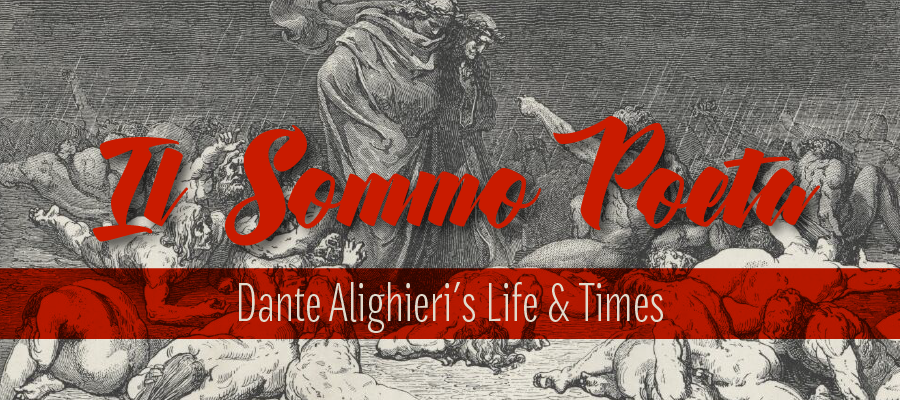
Along with Homer’s Iliad and Odyssey, Virgil’s Aeneid, and Milton’s Paradise Lost, Dante Alighieri’s Divine Comedy is one of the indispensable epics in the Western Canon. Without a doubt, the Divine Comedy is the most important literary work produced during the so-called “Dark Ages.”
But don’t think Dante’s work is just a historical curiosity that has no bearing on how we live nowadays. Dante’s words and images still have the power to profoundly move 21st century readers. Indeed, many Italians still call Dante “il Sommo Poeta” (which means “The Supreme Poet”) or simply “The Poet.” With an epithet like that, you know there’s something special going on.

Ritratto di Dante, Angelo Bronzino, circa 1530, via Wikimedia Commons
Anyone who reads the Divine Comedy from start to finish is forced to confront the most important questions surrounding the nature of God, justice, sin, the afterlife, and love. In this article, we’ll take a brief look at Dante’s life and legacy. Hopefully by the end of this piece you’ll be inspired to pick up The Divine Comedy for yourself and see why poets as renowned as T.S. Eliot have described The Divine Comedy thus:
“The highest point that poetry has ever reached or ever can reach.”
Dante Alighieri’s youth and early influences in Florence
What little we know of Dante’s life and times mainly comes from his poetic works. Researchers now know for a fact that Dante was born in Florence in the year 1265. All that we know about his parents is that his mother died when Dante was rather young and that his father remarried soon afterwards.
Brunetto Latini: Guelf writer
At the time Dante was growing up, Florence was undergoing a period of intellectual foment and political turmoil. The main political issue of the day was between the Guelfs and the Ghibellines. Put simply, the Guelfs believed in the primacy of the papacy, whereas the Ghibellines believed in giving power to the Holy Roman Emperor. In 1266, the Guelfs took power in the city, which led many Florentines to believe their city would soon become the “new Rome.”
We do know that Dante received an education from the prominent intellectual Brunetto Latini. Since Latini was a Guelf, he had lived in exile in France before the Guelfs took back power in 1266. During his time in exile, Latini produced major translations of Aristotle as well as scholarly works like Li Livres dou Trésor. This intellectually significant work, which Dante actually references in his Inferno, encouraged the values of the “intellectual citizen” exemplified by men like Cicero. Latini based his ideas of political philosophy and how a citizen should conduct himself from both ancient philosophers and the Bible. The importance Latini placed on “glory” and achieving immortality through one’s deeds left a profound impact on Dante.
Guido Cavalcanti: Poet and teacher
The first poem Dante ever wrote was probably in his late teens. He sent his sonnet to all the prominent intellectuals at the time, which attracted the attention of a poet named Guido Cavalcanti. Dante credits Cavalcanti with inspiring him to write his poems in the vernacular, and Dante even dedicates his first book, La Vita Nuova, to Cavalcanti. However, Dante and Cavalcanti’s relationship seems to have become strained later in life.
Dante writes extremely significant cantos in The Inferno where he meets both Cavalcanti and Latini in hell. Although he notes his indebtedness to both these great men, Dante felt the need to abandon their teachings in his quest for ultimate truth.
Beautiful Beatrice and La Vita Nuova
Although Latini and Cavalcanti were extremely important influences on Dante, the most significant person Dante met during his youth was a girl by the name of Beatrice Portinari. Scholars believe that Beatrice was the daughter of a local banker by the name of Folco Portinari.
The first time Dante met Beatrice was probably when his father brought him to a May Day celebration at the Portinaris’ house. Dante was 9 and Beatrice was 8 years old. Although Dante says he only met her one more time before her death at the age of 24, Beatrice’s beauty haunted him until the day he died. The spirit of Beatrice turns up everywhere in Dante’s verse, especially in La Vita Nuova and Paradiso.
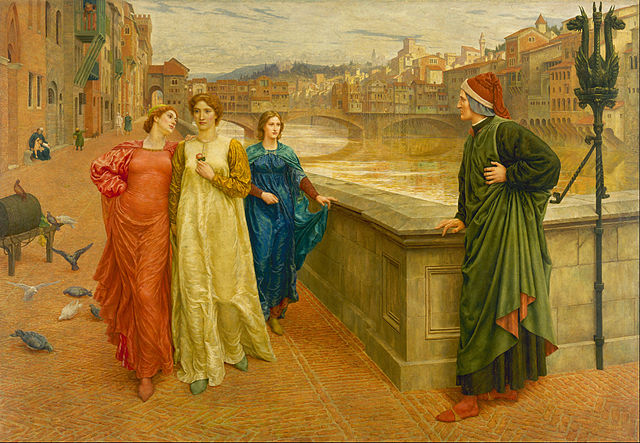
Dante and Beatrice, Henry Holiday, 1882-1884, via Wikimedia Commons
By the way, Dante married a woman named Gemma Donati in 1285, with whom he had three children. Beatrice, on the other hand, married a banker. Both of these marriages were arranged, as was customary at the time. Unfortunately, not much is known about Dante’s relationship with Gemma.
La Vita Nuova
As mentioned above, Dante’s first major work was called La Vita Nuova (or “The New Life” in English). Published in 1293, the work is a mixture of poems and prose called a prosimetrum. The prose sections of this work detail Dante’s first meeting with Beatrice, obstacles to a successful romance, and her untimely death. Many of the sonnets in this work were deeply indebted to a poet by the name of Guido Guinizelli. Guinizelli was instrumental in developing what came to be known as the “dolce stil nuovo” (or “the sweet new style”). This new kind of poetry focused on the virtues a lady can bring out in her lover. It was also a reaction against the more fashionable municipal poetry at the time.
La Vita Nuova is considered Dante’s first great work, and it’s highly advisable to read this short text before jumping into The Divine Comedy.
Dante’s political life and eventual exile
After Beatrice’s death, Dante became more involved in politics and started studying philosophy in his spare time. A few key authors that influenced Dante at this time were Boethius and Cicero.
In the 1290s, the Guelfs split up into the “Blacks” and “Whites.” Black Guelfs still supported the papacy, but the whites were more opposed to papal influence in governing over the empire. In particular, White Guelfs were distrustful of Pope Boniface VIII. Dante sided with the Whites in this struggle and became a public voice for White Guelf causes. Sadly, this allegiance would eventually lead to his exile from Florence.
In 1301, the Black Guelfs took over Florence with the help of the Pope and French forces. Dante was in Rome at the time as an emissary to the Pope. In 1302, the new government condemned Dante to be burned at the stake. Luckily for Dante, he was able to escape with fellow White Guelf supporters. He would never set foot on his native Florence again.
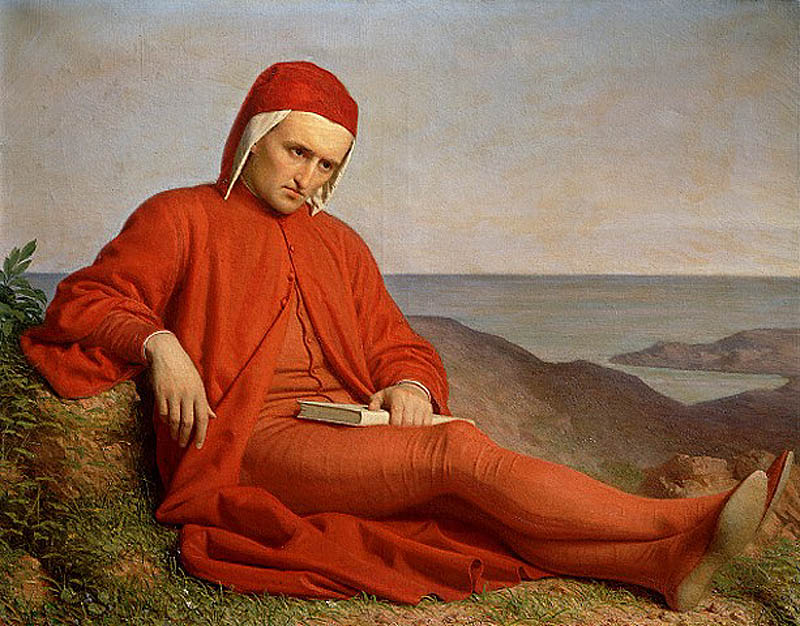
Dante in Exile, Domenico Peterlini (attributed), circa 1860, via Wikimedia Commons
At the beginning of this period of exile, Dante composed a few polemical works such as De Monarchia, De vulgari eloquentia, and the Convivio. Many scholars see these works as laying the groundwork for what would become his greatest achievement: The Divine Comedy. Anyone interested in Dante’s political and philosophical theories might find these three works interesting reading.
Brief overview of The Divine Comedy
Dante probably began writing The Divine Comedy (or just “The Comedy” in the original Italian) in 1308. He would continue working on this text while traveling around Italy and (possibly) France till his death in 1321.
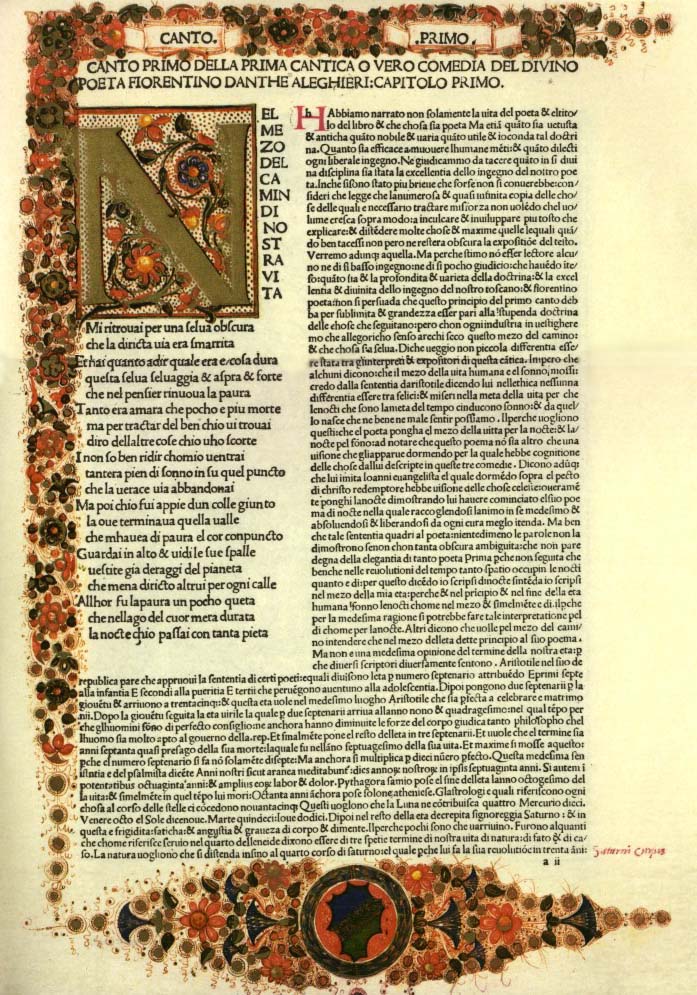
Inferno by Dante Alighieri, via Wikimedia Commons
Taking place between Good Friday and Easter in the year 1300, the work is divided into three main sections:
- Inferno
- Purgatory
- Paradise
The protagonist of this epic journey through hell, purgatory, and heaven is none other than Dante himself. The great Roman poet Virgil leads Dante through hell and purgatory, encountering the souls of popes, former friends, mythic beings, legendary men and women from history, and even the Devil along the way. When he reaches the summit of Mount Purgatory, Beatrice greets Dante and leads him through the celestial realms.
This poem is often compared to a perfectly constructed cathedral due to both its structural perfection and its divine message. All of The Divine Comedy’s cantos (somewhat like chapters in a novel) are written in a Tuscan dialect of Italian using a rhyme scheme called terza rima (which goes aba, bcb, cdc, etc.).
There are 33 cantos in each of the three sections, which (plus an introductory canto in Inferno) make a total of 100. Interestingly, scholars have found that you can read the same numbered canto from each of the three sections of the poem and find certain correlations.
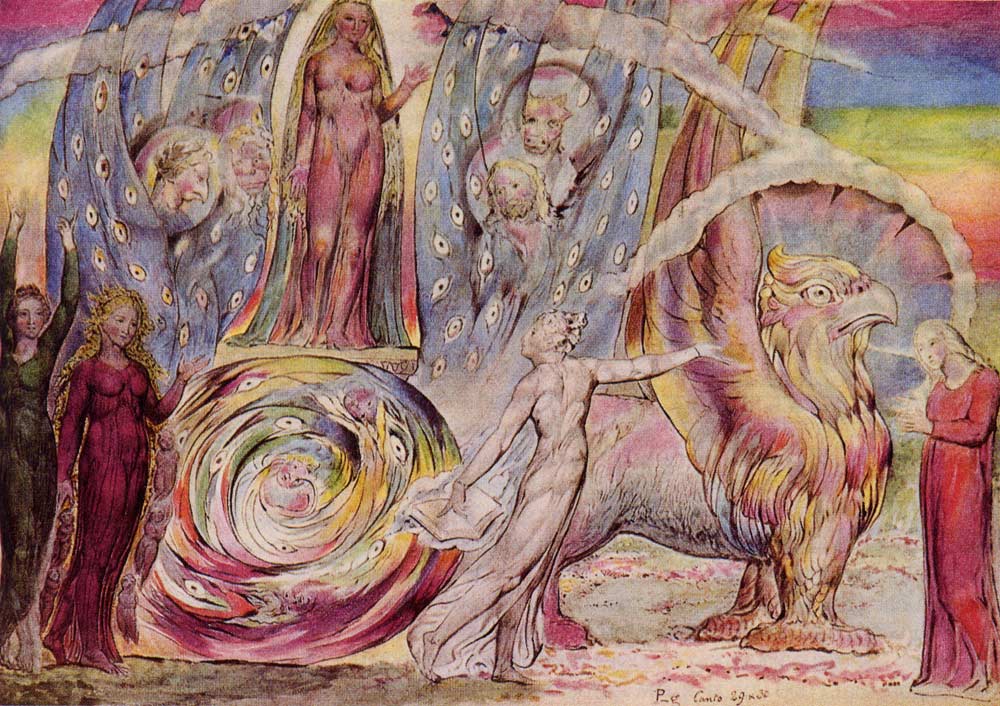
Beatrice Addressing Dante, via Wikimedia Commons
It’s simply impossible to go into all the reasons why this work is so important to world literature. Philosophers, theologians, artists, mystics, occultists, scholars, and poets have been studying this work in detail ever since it was written.
One interesting thing about this epic poem is that it’s deeply personal, which many Romantics in the 19th century celebrated. Instead of dealing with the epic struggles of mythic heroes as Virgil and Homer did, Dante made himself the subject of the epic and placed people he knew (whether they were Popes or peasants) in heaven, hell, or purgatory as he saw fit. Also, Dante’s epic was the first to draw on the Christian worldview more than the Classics in the Western tradition.
Dante’s legacy and impact on world literature
When Dante died of malaria in Ravenna, Guido Novello da Polenta (with whom Dante stayed during his exile) gave him a proper burial. Many important scholars of the time attended the funeral, which indicates just how influential Dante’s work was in his own time.
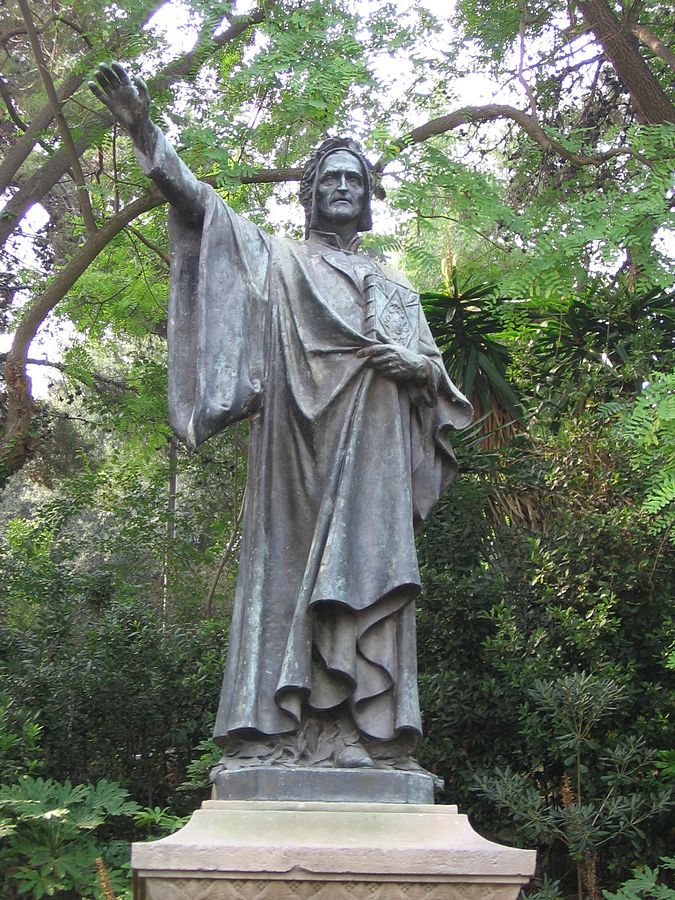
Statue of Dante in Barcelona, by Cesare Zocchi, photo by Canaan, via Wikimedia Commons
Within less than 100 years after Dante’s death, there were already 12 commentaries written on The Divine Comedy. Publishers in Venice were so amazed by Dante’s work that in 1555 they added the adjective “divine” to what was initially just called Commedia. The only other writer in the West that has had as significant impact on world literature would probably have to be Shakespeare.
The imaginative power and technical perfection of Dante’s work continues to inspire men and women around the world. Check out just a few great writers who have been directly inspired by Dante:
- Ezra Pound
- William Blake
- Honoré de Balzac
- Henry Miller
- William Butler Yeats
- T.S. Eliot
- James Joyce
- René Guénon
Even though this work is deeply rooted in the specifics of Dante’s life and times, the reader soon understands that Dante’s journey down to Satan and up toward God is really the journey of the whole of mankind. From the darkest depths of greed, hatred, and delusion, up to the perfected light of love, compassion, and justice, Dante’s poetic journey is truly a life-changing reading experience.





Leave a Reply
Be the First to Comment!